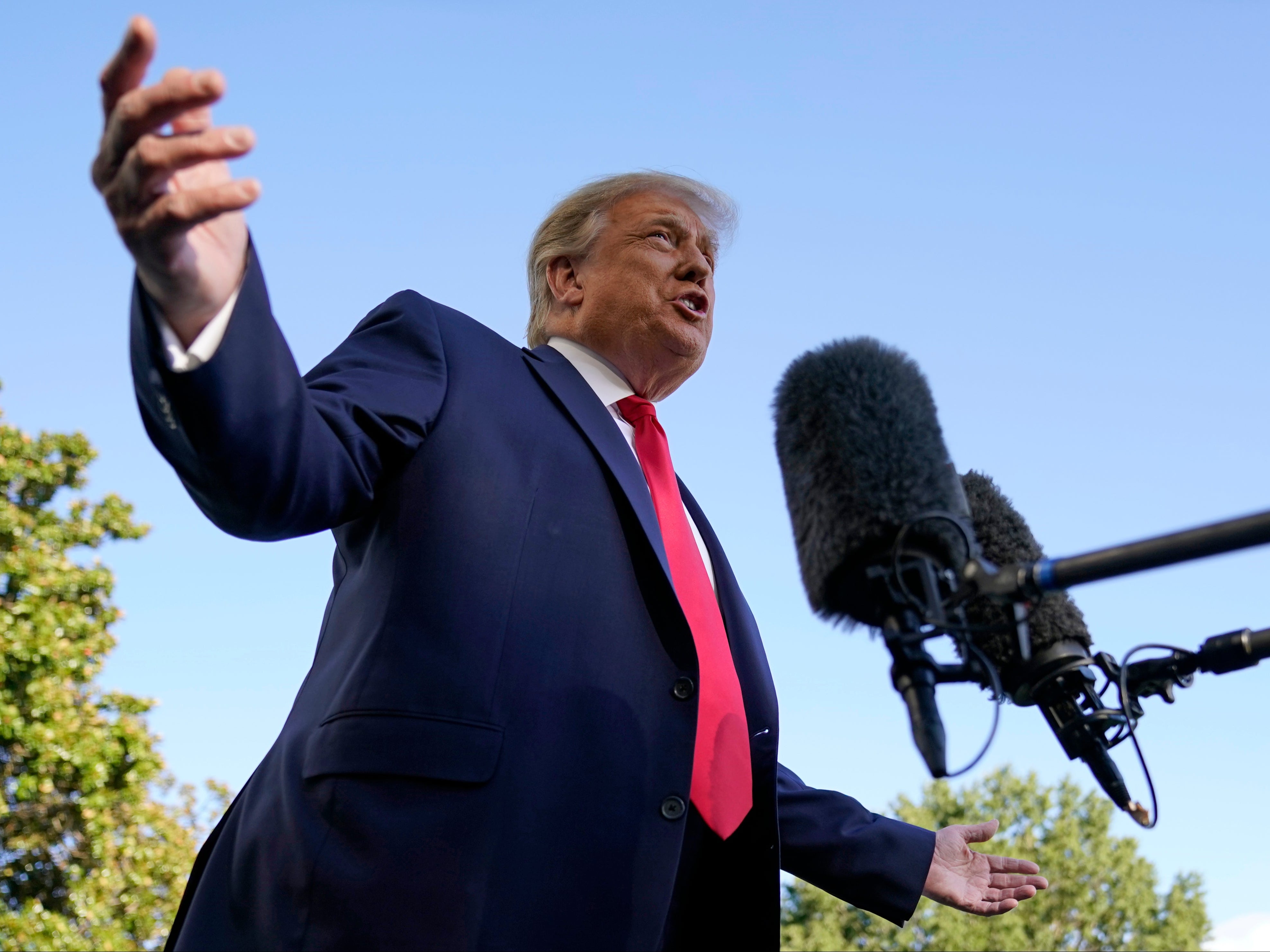Trump and Republicans have few political incentives to delay vote on Supreme Court nominee
Donors, dollars and difficult Senate races mean Republicans could have just one shot to ensure a conservative majority on the high court for decades, writes Washington Bureau Chief John T Bennett


Donald Trump and Mitch McConnell are moving ahead full-throttle with their intention to put a sixth conservatice just on the Supreme Court before Election day, cognisant of and bowing to a number of political realities and a system that gives them few incentives to delay.
The president started the first full workday since Justice Ruth Bader Ginsburg passed away on Friday by letting Senate Republicans know he wants them to close ranks quickly behind his desire, fully embraced by Mr McConnell, that the chamber take up his coming nominee and vote to place them on the high court before 3 November.
“We were put into this position by voters,” Mr Trump said as Republicans contend voters handed them the White House and Senate in 2016, even expanding that upper chamber majority two years later. On Sunday, several McConnell allies hit the political talk show circuit to argue they and the president have a “constitutional duty” to nominate, vet and confirm a justice to restore the court to its nine-juge dais as soon as possible.
“We have a lot of time before [the election],” Mr Trump told “Fox & Friends” during what is becoming a weekly feature on the right-leaning cable morning show. “I think it should go before.”
So, too, do a growing number of Republican senators.
“No one should be surprised that a Republican Senate majority would vote on a Republican president’s Supreme Court nomination, even during a presidential election year,” retiring GOP Senator Lamar Alexander said in a statement. “Senator McConnell is only doing what Democrat leaders have said they would do if the shoe were on the other foot.”
Even institutionalist Republican senators like he and Ohio’s Rob Portman, who could have put Senate traditions and decorum above doing whatever it takes to secure a 6-3 conservative bend on the court, say full steam ahead. Through a lens of cold political analysis that filters out two days of aggressive posturing and talking points-spouting, Republicans have little choice but try to confirm Mr Trump’s coming pick before Election Day.
A big reason why: Paltry polls
The president’s approval rating has held remarkably constant during his term, hovering between 40 per cent and 45 per cent, despite his chaotic term and self-made controversies and scandals. It stands at 42 per cent as of 13 September, according to Gallup.
Also mostly static: The margin by which he trails former Vice President Joe Biden, the Democratic presidential nominee, in national polls. RealClearPolitcs’ average of several surveys gives the president a 6.5 percentage point lead nationwide, and shows Mr Trump still trails in too many battleground states to secure a second term (assuming those polls are more accurate than in 2016, that is).
As Mr Trump has stumbled answering the coronavirus outbreak and address racial tensions, he also has failed to erase the former VP’s leads, even if he has closed some ground. But something else significant happened during Mr Trump’s tumultuous summer: Voters transferred some blame to congressional Republicans. So much so that a memo released last week by Senate Republicans’ campaign arm described their upper chamber majority as “at risk.”
“The next few weeks will define the future of our country for generations to come,” states the memo.
The National Republican Senatorial Committee missive paints all six races involving incumbent GOP senators are competitive, suggesting the party could lose most of them – even indirectly sounding an alarm over the seat occupied by Judiciary Chairman Lindsey Graham, the man who is poised to fast-track Mr Trump’s coming nominee.
“Make no mistake: the Senate Majority is at risk. Beyond the four battleground states of Colorado, North Carolina, Arizona and Maine, Democrats are going on offense in historically red states like Montana, Iowa and Georgia,” the memo continues. “They’re even eyeing states like South Carolina, where [Democrat] Jaime Harrison just reported raising a staggering $10.6m in August alone.”
In short, should Mr Trump lose and his party find itself headed for the minority, Republicans might lose momentum to take up the nomination during a two-month session following the election, should voters send a signal they want Democrats in charge on both ends of Pennsylvania Avenue.
Donors and dollars
Two other reasons for the warp speed approach: Donors and dollars.
Mr Trump and Republicans made a fragile peace after he won the 2016 election. For a year after he was sworn in, reporters swarmed GOP senators in hallways to get their reaction to his latest incendiary tweet or insult-laden campaign rally.
They sometimes expressed disappointment, but the mostly stayed in lock step behind their party’s unlike Pied Piper. They did so mostly for this moment: The opportunity to ensure a conservative majority on the high court for decades, something the president made clear on Monday morning is a big part of his push to watch as a third conservative justice is seated under his watch.
“You like to go young because they’re there for a long time,” the president said, telling Fox his entire shortlist of “five, probably four” candidates is composed of “young” potential justices who could take over Ms Ginsburg’s seat for decades. He then sent a message to big-money Republican donors, saying he will select a nominee who “abides by the Constitution.”
Then there is the economy, which has started bubbling again after shedding jobs and triggering recession worries during the coronavirus lockdown. Mr Trump and Republicans believe they can inject some certainty in US stock markets, which underwent a massive selloff on Monday morning over jitters about political chaos stemming from Ms Ginsburg’s seat becoming vacant, by restoring the high court to a nine-justice dais.
“I think conservatie justices are en vogue,” Larry Kudlow, the president’s chief economic adviser, said Monday in a signal to Wall Street, adding of Mr Trump’s previous two Supreme Court nominees and hundreds of lower-court picks: “I think by-and-large they have been popular choices.”
Then came what amounted to a plea for Wall Street to reward a pre-election vote with a big market bounce: “He’s nominated experienced, strong people, free-enterprise people, people who don’t like a lot of regulator interference with businesses. I think those are actually big plusses for the economy.”




Join our commenting forum
Join thought-provoking conversations, follow other Independent readers and see their replies
Comments